KOTOR 1 v. KOTOR 2 Part 1 Redux
By ChampInMaking 12 Comments
Alrighty so after the misfire of old part 1 lets get down to business. Let's roll up the sleeves and get in to it. It is my mission now to convince you that KOTOR 2 is better than KOTOR 1. The lost potential bit is still my lament over no KOTOR 3 but that will be later. Anyways let's kick it off!
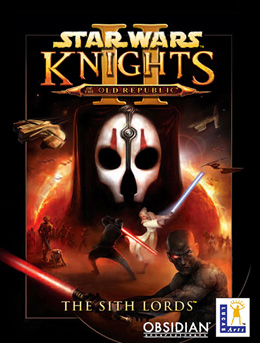
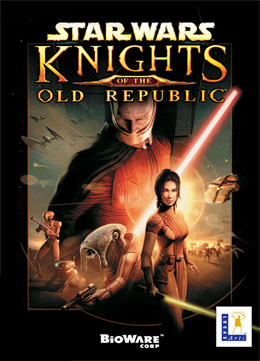
The Systems
As we know both games are based off of the Dungeons and Dragons D20 system where you queue up attacks and the game is rolling the dice behind the scenes to see whether or not you hit. As you level up you gain feat and powers to augment these dice rolls for more damage, better chance to hit, chance of stun, all that jazz. In both games the combat is effectively the same. Aside from more animations in fights. The real difference comes in the implementation of skills in the game both in and out of combat.
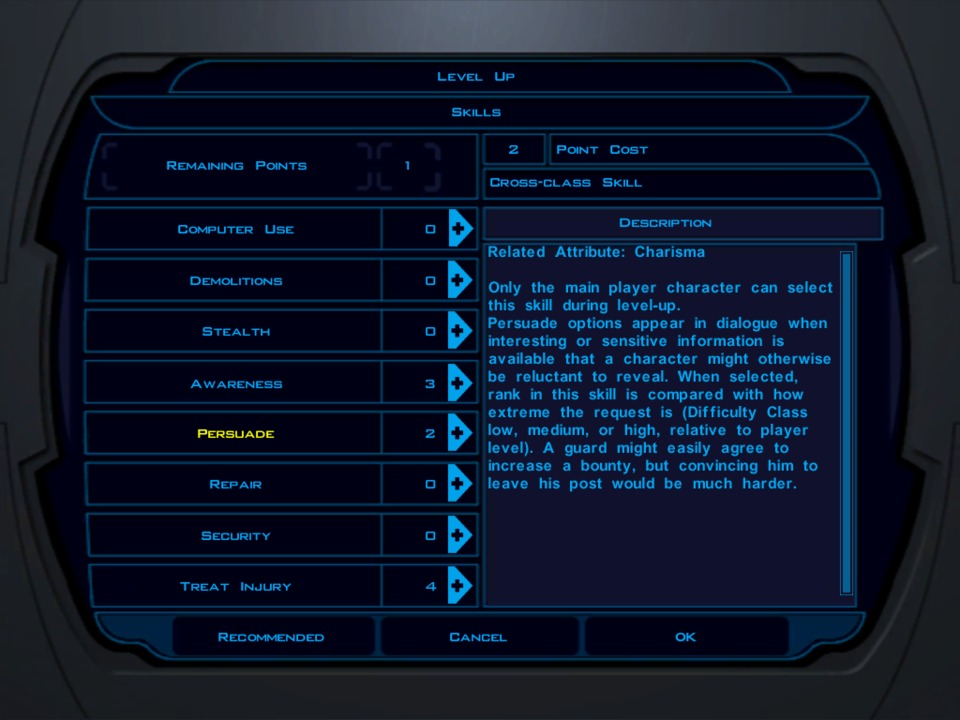
In KOTOR 1, skills aside from treat injury and persuade were basically useless. Treat injury increased your healing with both healing items and healing skills like Force heal. Persuade was a main character only skill which allowed you to convince people of things. These would range from bartering the price of things up or down in your favor in certain scenarios to forcing a panel of judges proclaiming you innocent even though you are clearly lying to them. Everything else served no purpose. Why pick or slice locks when you can just bash the door? Items in locked containers also could be found by just smacking it with your lightsaber. Demolitions allowed you to recover or defuse hostile mines. You could do that... or if you're like me you just switch characters to like Mission and run her into all the mines and heal her up with force heal until they have all exploded. Done. This goes with every skill, whatever options they offer can be done easier by some other obvious way. That and putting points into persuade allows you more options in dialogue and treat injury makes your heals huge. Why wouldn't you pick them?
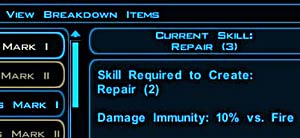
KOTOR 2 greatly expanded the skills in several ways. First was through crafting. Now in KOTOR1, you could alter some of your weapons at a workbench with scopes and stocks for blasters and up to 2 crystals for a lightsaber (aside from color). KOTOR 2 increased that from 3 slot for blasters and 2 for lightsabers to 6 for blaster and 5 for for lightsaber (again color not included). This also changed for armor as all Jedi robes, among the other armors, had slots for upgrades. To add on, you could now craft upgrades for these slots that became better and better as you leveled up a particular skill. Awareness for example, gave access to a scope increasing critical hit chance and leveled up Awareness you gain the ability to create even more powerful versions.
Additionally skills unlocked different dialogue options in conversation. Were you talking with someone about a computer? Then "Computer Use" gave you an option to say something that you normally wouldn't have the option to say much like how Persuade worked in the previous game. This added interesting role-playing elements as you character would actually show the fruits of your labor in term acting like an expert whatever skill. Persuade now had to fight for points as it didn't offer any benefit other than dialogue (apparently being really good at talking does not make you good at welding)
On top of that, skill checks were much more prevalent in the KOTOR 2 as some of the best items were behind locked doors or computer locks and the like. Bashing would not work anymore to get items out of locked containers. You could do it but the item would most likely just break rendering it completely useless.
Building off both of those points, these skill checks would often play a role in the character development of your party. Almost every party member had checks in their dialogue after a certain point of talking with them. These checks weren't just there for nothing either, they would often lead to them unlocking new feats, abilities and even some would increases your own abilities such as adding your wisdom modifier to your defense or just gaining a permanent plus to chance to resist Force attacks. This leads me to my next point:
Party Interaction
In KOTOR, there were a few points (mostly in the beginning) where the party would comment on what was happening or a little skit would happen that you would sit back and listen to. Nine times out of ten they were mostly for no real purpose other than a little character development or jokes in Mission and Zaalbar's case. Not so in KOTOR 2, these were in fact some of the most important parts in the game as far as the development of not only their characters but also their fighting abilities.
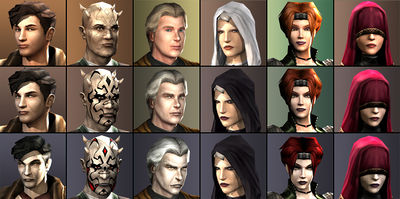
KOTOR 2 added a system known only really as "Influence." Where your interactions with the character affected how they felt about you in several ways. The most obvious of which was simply agreeing with them on certain things. Others would be less obvious like helping out someone in a specific way or allowing them to do something. This would gain influence with them and open up further dialogue options. One of the main hooks of all these influence checks was that once you got enough influence with them you gained the ability to train them to become a jedi for those who weren't one already. With that they then gained the ability to use lightsabers and the force. This was very useful as you only had two character who were Jedi when you first got them. Here the game was actively rewarding you for delving into the characters' backstories.
Another cool aspect was how they would react to your actions as each character had specific like and dislikes and knowing those would help you gain influence with them. Also, they for darkside users they would begin to change their appearance as you see in the picture to reflect your own standing in the darkside. Although this wouldn't affect their personalities (Bao Dur would still be a good guy despite looking like Darth Maul) it was a very cool reward to see your choices not only manifest on yourself like in KOTOR1 but also on your party members.
For characters that you could not turn into Jedi like the famous HK-47 and T3- M4, you had to get both influence and have enough of the required skill such as Repair. These would more often than the other character net bonuses to not only you but to the party member. I don't know about you but in KOTOR 1 whenever I was walking around and the game stopped me because I hadn't talked to Carth in a while, it was super annoying. Now there is an actual reason aside from story to talk to you party members which makes you actually want to talk to them instead of the other way around.
That seems a good place to stop, I hope this seems a little more focused look at what I wanted to do originally. Thanks to everyone who responded in my first attempt at this. I just want to make remember these games and how cool they were at the time. Again, I appreciate any feedback. Next time we'll start dealing with characters a little more in depth and why Atton is waaaaay better than Carth. Thanks again!
